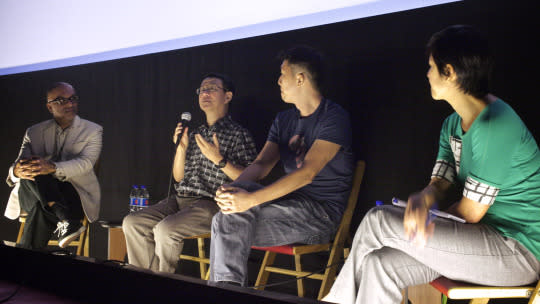Singapore’s freedom of speech in question: former NTU journalism professor

(L-R) Panelists Cherian George, Alex Au, Ken Kwek, and chair of the discussion, Teo You Yenn at the “Deliberating Freedom of Expression in Singapore” panel organised by the Singapore Advocacy Awards (Photo: Calum Stuart)
By: Calum Stuart
Speaking to a full auditorium, former Nanyang Technological University journalism professor, Cherian George, was not shy when conveying his views to the audience.
“Of all the advanced industrial nations, Singapore has by far the least freedom of expression,” he said in his opening speech.
This is, perhaps, unsurprising. George, who now lives and teaches in Hong Kong, is a well-versed and known critic of Singapore’s off-limits topics, or ‘OB markers’. A panel discussion on free speech and expression in Singapore was the ideal place to air his contentious sentiments.
Held at The Projector on Saturday (Jul 4), Deliberating Freedom of Expression in Singapore saw George speaking alongside film-maker Ken Kwek, and blogger Alex Au in a panel organised by the Singapore Advocacy Awards. The underlying message of the discussion was clear: restrictions on freedom of expression used as short-term solutions undermine long-term political, social and cultural gains.
“The irresponsible exercise of freedom of expression can be harmful,” George continued, “but these dangers pale in comparison to the miseries caused throughout history by the powerful silencing free speech.”
“Freedom of expression is about giving all (people) the right to be heard, not just giving ourselves the right to speak. It is about recognising the shared humanity of total strangers, including people who may have very different values and interests from us. It is in this respect, that I consider living with freedom of expression as a universal right to be a deeply selfless act of citizenship.”
The discussion went on to address the issue of why free speech is often viewed with skepticism in Singaporean society, not just by authorities but by ordinary citizens.
“Freedom (of expression in Singapore) is often only seen as selfish and irresponsible,” noted Au, who was convicted of contempt of court earlier this year for scandalising the judiciary in a blog post. “Unless we can unpack that problem, we’re not going to make any effective progress. I think we really need to explore that. Because it’s not just the people in power - why do we, as Singaporeans, consider freedom of expression as selfish and irresponsible?
“(Singaporeans) often continue to penalize things they don’t want to hear. I think this stems from a deep sense of insecurity. And when we feel insecure, we want that security of rules, controls and bans to keep us going.”
Have faith in public to handle free speech: Cherian George
This was echoed by Kwek, whose film Sex.Violence.FamilyValues, was banned for a short time in Singapore due to complaints about racial sensitivities. “My real concern as an artist in Singapore is about ‘the guy next door’,” he said. “The reason my film was banned is because somebody – a neighbour, an MP, whoever it may be – complained about it, which necessitated official action. While there are the occasional battles with the authorities on what you can-and-cannot say or show, what I find troubling is not (the actions) of those higher up on the aristocratic triangle, but from the guys at the bottom.”
Comparisons were also drawn to the recent case of Amos Yee, a teenager who was convicted of wounding religious freedoms and distributing obscene content after posting a YouTube video and blog post after police reports were lodged by members of the public.
This, panel members insisted, is an issue which would need addressing, particularly at a time when the public’s ability to communicate with a global audience has never been greater: “In the last 10 years obviously the world has changed; the country has changed,” said Kwek. “There are a lot more voices now – a lot more different platforms to air views, such as the internet and social media.”
The panelists conceded the case for free speech and expression will never be water-tight and the lines of acceptable levels of free speech are often blurred, such as in cases of hate speech or national security. “I’ll readily admit that many people around the world use freedom of expression selfishly and irresponsibly,” George summarised. “But I would request that we acknowledge that the same is true of any powers who curtail that freedom.”
“When we transcend this primordial instinct and say that we are prepared to hear out those who seem alien and even offensive, that we won’t automatically threaten to sue or lodge police reports against those who upset us, that we will try engagement and have faith in the public’s ability to discern the better argument, there’s nothing selfish about any of this; it is about taking responsibility for building a stronger society.”

